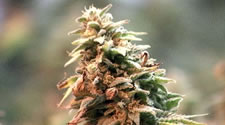 Last month, the DEA enthused the pharmaceutical industry but disappointed cannabis advocates by re-scheduling the drug Epidiolex—but not CBD, the cannabinoid that makes it work. Now word emerges of a letter to the DEA by the Food & Drug Administration essentially calling for the descheduling of CBD altogether.
Last month, the DEA enthused the pharmaceutical industry but disappointed cannabis advocates by re-scheduling the drug Epidiolex—but not CBD, the cannabinoid that makes it work. Now word emerges of a letter to the DEA by the Food & Drug Administration essentially calling for the descheduling of CBD altogether.
On Sept. 27, the Drug Enforcement Administration for the first time rescheduled a cannabis-derived product—Epidiolex, a treatment for epileptic seizures. Epidiolex was placed in Schedule V of the 1970 Controlled Substances Act. This is the classification for drugs with accepted medical applications and a low potential for abuse.
But much to consternation of cannabis advocates, CBD, the cannabinoid that is the active ingredient in Epidiolex, was not itself rescheduled. It remains in Schedule I, the highly restrictive classification for drugs that supposedly have a high potential for abuse and no legitimate medical applications.
The path to this seemingly contradictory policy began with the Food & Drug Administration’s June 25 approval of Epidiolex, produced by the British multinational GW Pharmaceuticals. This approval came despite CBD's Schedule I status. With the DEA obliged by the FDA decision to reconsider that status, cannabis advocates hoped that CBD would be rescheduled, or even descheduled—that is, removed from the schedule system entirely. These hopes were dashed by the DEA's decision to just reschedule Epidiolex.
Inter-bureaucratic bickering brought to light
Now, Marijuana Moment website reports that in a May letter to the DEA, the FDA had actually questioned whether CBD should be considered a controlled substance at all. The letter reveals something of the bureaucratic back-and-forth between the two agencies concerning CBD and its status under both the Controlled Substances Act and the UN Single Convention treaty, which sets international standards for the classification of controlled substances.
According to the FDA letter, studies have demonstrated that "CBD and its salts...do not have a significant potential for abuse and could be removed" from the Controlled Substances Act.
The FDA found that CBD has "negligible potential for abuse," has a "currently accepted medical use in treatment," and that any possible abuse "may lead to limited physical dependence" similar to other Schedule V drugs. "Upon consideration" of these and other factors, the FDA asserted that CBD "could be removed from control" under the CSA.
"We reach this conclusion because we find that CBD does not meet the criteria for placement in any of Schedules II, III, IV, or V under the CSA," the letter stated.
However, the letter also made note that the previous month, the DEA had "asserted that the United States would not be able to keep obligations under the 1961 Single Convention on Narcotic Drugs if CBD were decontrolled under the CSA."
In response to this concern, the FDA amended its recommendation, advising the DEA to place CBD in Schedule V, the least restrictive category under the CSA. But the FDA included a caveat, still holding out hope for CBD's eventual descheduling: "If treaty obligations do not require control of CBD, or if the international controls on CBD change in the future, this recommendation will need to be promptly revisited."
Industry encouraged; activists not so much
The DEA's own statement upon its September decision was somewhat equivocal. "DEA will continue to support sound and scientific research that promotes legitimate therapeutic uses for FDA-approved constituent components of cannabis, consistent with federal law," the agency's acting administrator Uttam Dhillon said in a press release. "DEA is committed to continuing to work with our federal partners to seek ways to make the process for research more efficient and effective."
The pharmaceutical industry was immediately enthused, with companies hoping their own cannabis-derived products could be next.
Nevada-based GB Sciences—now working with Catalent of New Jersey to develop a cannabinoid-based treatment for Parkinson's disease—said in a press release that the company "has gained momentum in its innovative drug discovery program with the Drug Enforcement Administration's decision... There is now both a regulatory precedent for market approval on a plant-based cannabinoid-containing drug and a path to its commercialization... The odds of successful commercialization of cannabis-based therapeutics have now been greatly increased, not only in the US, but given the stature of the US FDA, across the globe."
Added Dr. Andrea Small-Howard, chief science officer of GB Sciences: "I am very hopeful about the rescheduling of FDA-approved CBD to Schedule V... This may be the best time in history to be developing cannabis-based medicines!"
But her statement was somewhat misleading, as the DEA actually hasn't rescheduled CBD—only a patented pharmaceutical product that contains the cannabinoid.
Cannabis advocates meanwhile lament not only that CBD itself remains in Schedule I, but that neither the FDA nor DEA has considered any change in the Schedule I status of the psychoactive cannabinoid THC.
"We anticipated that Epidiolex will be the first of many potential FDA-approved medicines based on the cannabis plant. These are welcome alternatives," said Paul Armentano, deputy director of the National Organization for the Reform of Marijuana Laws (NORML), speaking to The Fix, a website dedicated to issues of addiction and recovery. "But these products should not be regulated in such a manner that patients no longer have ready access to herbal cannabis—a product that humans have used safely and effectively as a medicine for thousands of years and is approved today by statute in 31 states."
Cross-post to Cannabis Now
Photo by Barbara Doduk







Recent comments
4 weeks 1 day ago
4 weeks 1 day ago
7 weeks 2 days ago
8 weeks 1 day ago
12 weeks 2 days ago
16 weeks 13 hours ago
20 weeks 18 hours ago
20 weeks 6 days ago
30 weeks 6 days ago
34 weeks 6 days ago